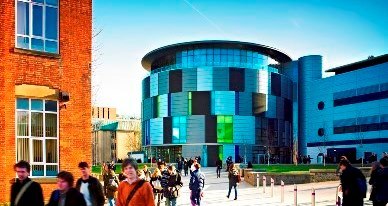About Us

About the SOFI CDT
The CDT combines expertise from three universities, industry and central facilities to deliver a comprehensive training programme and a wide range of research projects from across the full range of science. It will provide industrially integrated post-graduate training in research, enterprise and innovation for future industrial leaders in Soft Matter and Functional Interfaces (SOFI).
The core aim of the CDT is to train the next generation of industrial SOFI science and enterprise leaders by providing a rich programme of industrially integrated post-graduate training.
To deliver this the CDT includes:
- A broad-based, team problem-solving approach to core SOFI subject-specific training
- An experience of acquiring high-level soft matter science within an industrial and multidisciplinary context
- A supported cohort-based doctoral training experience
- Transferable, enterprise-focussed soft skills training
- Research training via industrially-inspired PhD project
- A mini-MBA coordinated by the Durham Business School including modules in project management, leadership, responsible innovation, marketing and best practice in collaborative innovation
SOFI CDT Structure
All students joining the CDT will initially be registered at Durham University where they will stay for the first six months. After the first six months of cohort training and exposure to the entire CDT network, students will be supported to make an informed choice of PhD project and will then be registered for a PhD at the appropriate university. The first six months of their PhD will be in the form of a research training programme.

All students entering the SOFI CDT are offered accommodation in St Mary’s for the first six months of training. Colleges in Durham provide much more than just a student hall of residence (giving opportunities to take part in sporting, artistic activities, giving humanities science breadth through interaction with resident and visiting fellows). St Mary’s will act as the social, community and training hub of the CDT.

Cohort Training
The cohort training will be focussed in the first six months of the 4 years. The key learning outcomes are to:
- Acquire a broad-based knowledge that allows informed discussion across the entire spectrum of SOFI science and advanced knowledge of SOFI science more closely related to your own personal research interests.
- Appreciate the business context and multidisciplinarity of SOFI science and to develop business awareness.
- Develop a mind-set for learning through problem-solving.
- Develop team-working, peer-tutoring and peer assessment skills.
Six-month research training project
Following exposure to the entire CDT network during the first 6 months you will co-develop and carry out a six-month project within a research group at one of the universities or industrial partners. This project will encompass skills training in methodologies and techniques that will be relevant to your final PhD project and therefore it is likely (but not mandatory) that this project will be carried out within the research group that you will carry out your PhD.
Continued Cohort Activities
Throughout SOFI PhD projects, you will receive continued training and opportunities.
The CDT enterprise-focussed transferable skills training program
SOFI CDT students will receive enterprise-focussed, soft-skills training and business awareness consisting of a three-part portfolio: (i) transferable skills training including (ii) two communication training residential courses co-delivered by industrial partners and BBC Radio and (iii) the SOFI-CDT Mini-MBA.
An international experience
Every student in the CDT will have the opportunity to gain international experience via a three month (or longer where appropriate) overseas placement either at an international site of one of the industrial partners or within a research group at of one of the SOFI global academic partners.
Responsible innovation (RI)
RI is a state-of-mind that will be embedded within the CDT from the outset and will be introduced to the cohort by Professor Phil Macnaghten, Durham University, Department of Geography. Prof. Macnaghten is an international leader in the growing field of social responsibility in innovation. RI will also be tensioned against commercialisation as part of the mini-MBA and in a public, cohort-led debate.
The SOFI CDT Mini-MBA
The SOFI CDT includes a “mini-MBA” in the form of two 2-week summer schools held in the second and third years. The Mini-MBA will include the topics: Project management, finance, marketing, leadership and Entrepreneurship, collaborative/responsible innovation, research commercialisation and change management. The core delivery will be by Durham Business School staff (DUBS) including Professor Kiran Fernandez, who is an expert in technology-based business and open innovation.
Key advantages for SOFI CDT PhDs
Richer and more realistic network of academic and industrial collaborators.
From the outset the CDT aligns SOFI science with complex industrial challenges.
Aspects of the cohort-based training prepare students for effective R&D in industry.
The unique structure creates space for imaginative connections between PhD projects.
